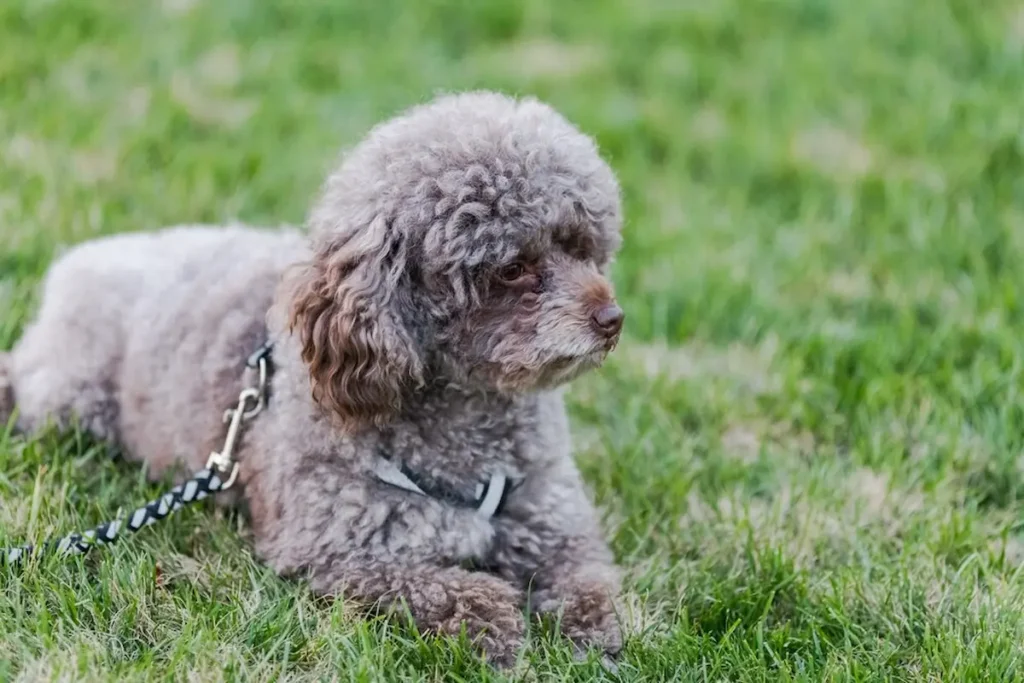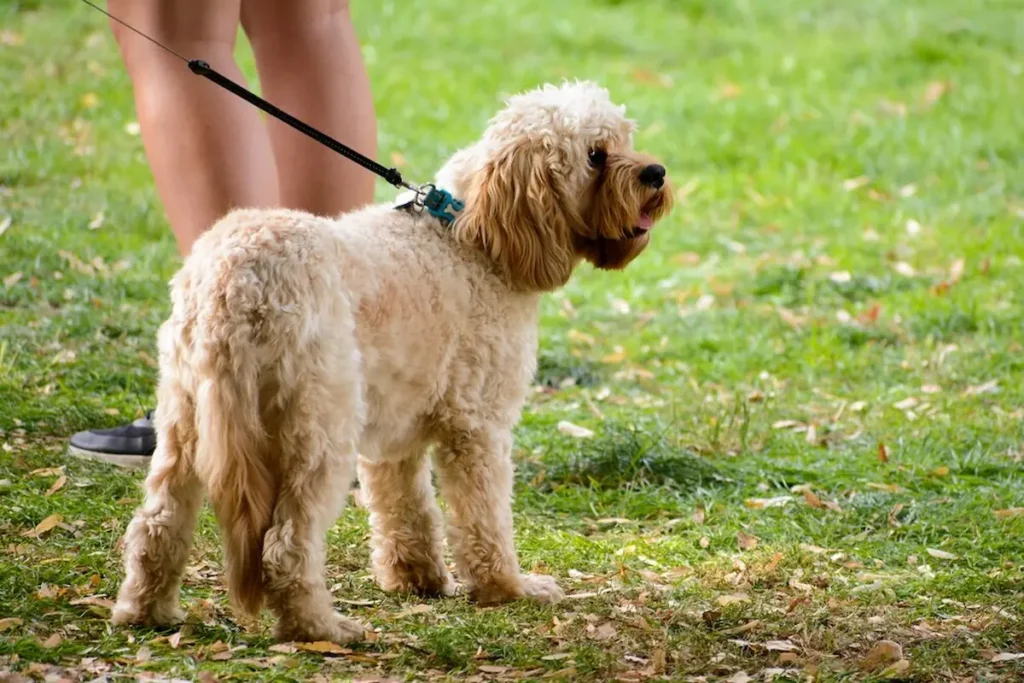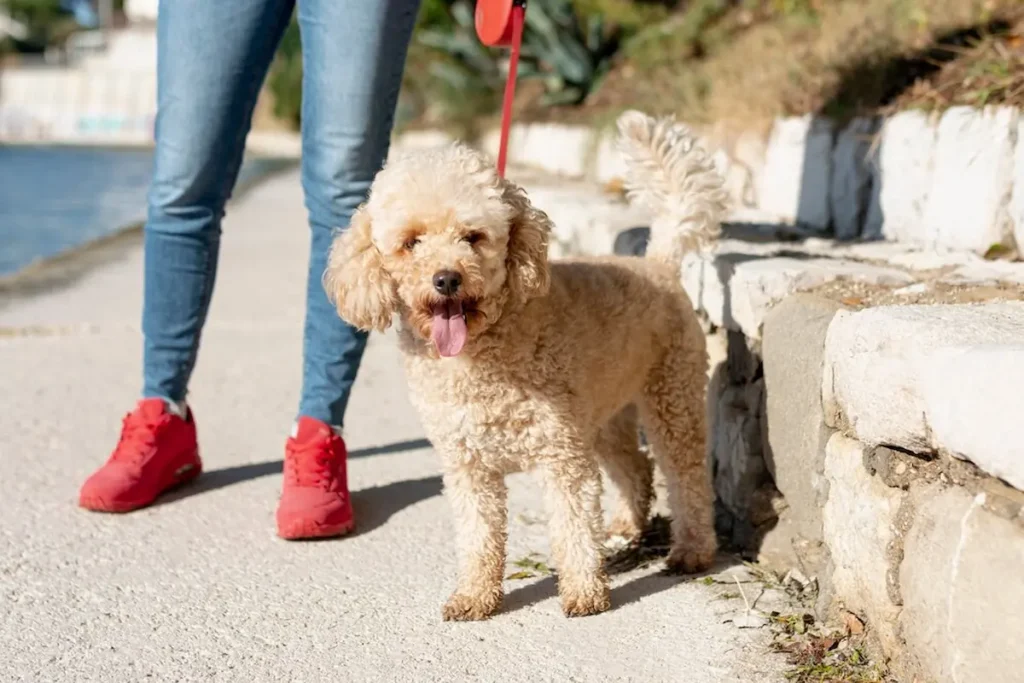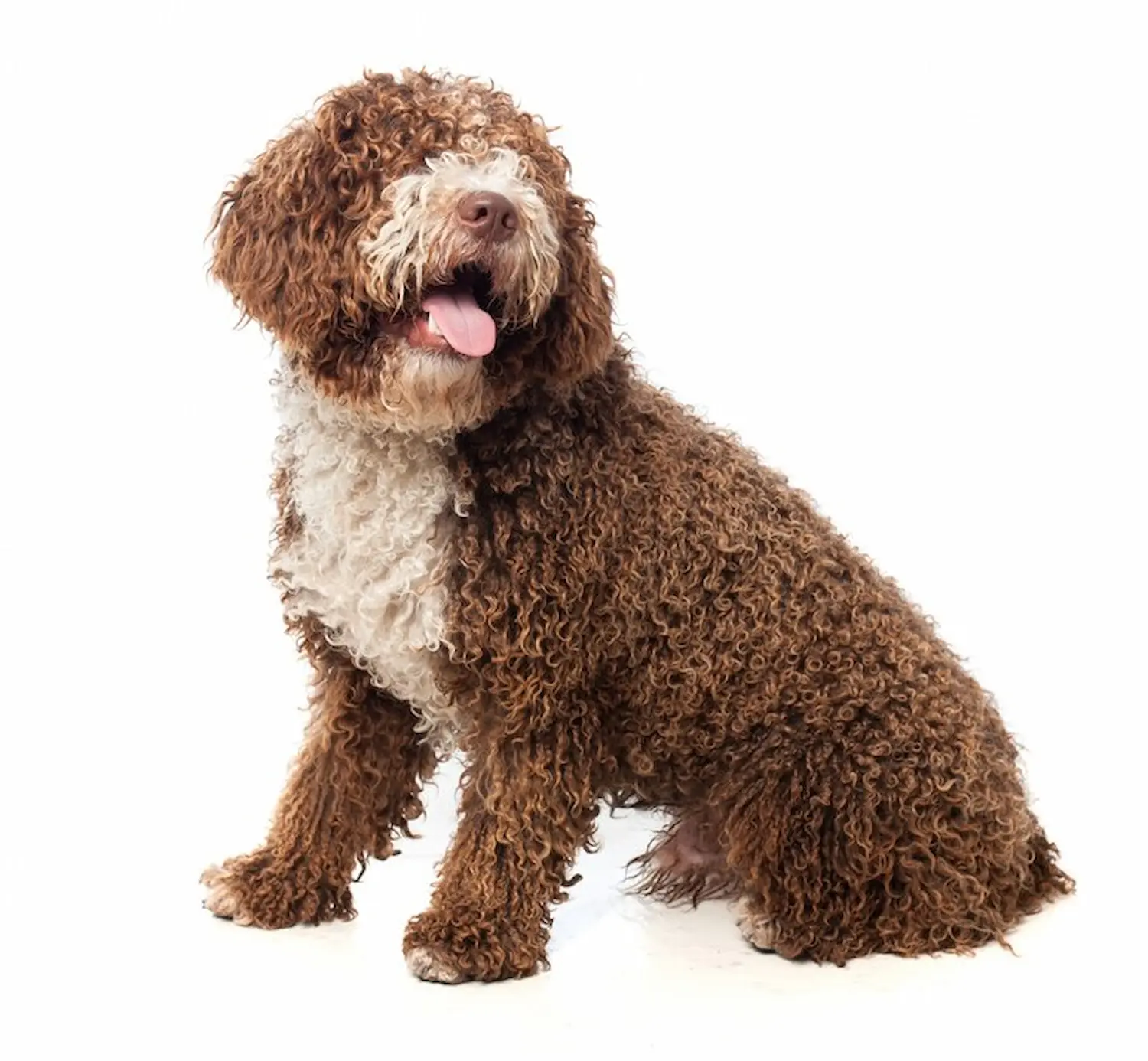Introduction
Are you looking for a dog that’s smart, playful, and full of energy? If so, you might want to consider the Aussiedoodle! This delightful breed, a mix of the intelligent Poodle and the hardworking Australian Shepherd, brings together the best of both worlds. Aussiedoodles are known for their trainability, affectionate nature, and lively spirit. Whether you’re a first-time dog owner or a seasoned pet parent, this guide will give you everything you need to know about this amazing hybrid breed.
What Is an Aussiedoodle?

The Aussiedoodle is a crossbreed, often referred to as a “designer dog,” combining the intelligence of the Poodle with the energy and herding instincts of the Australian Shepherd. These dogs are incredibly versatile and can adapt to various lifestyles, making them a popular choice among dog lovers. But there’s more to them than just their cute looks. Let’s dive into the full picture of this unique breed.
The Appeal of This Playful Hybrid
There’s a reason Aussiedoodles have gained so much popularity in recent years. With their charming personalities, high intelligence, and strong bond with their human families, they truly stand out. They thrive in active households, love learning new tricks, and are always up for an adventure. It’s no wonder they’re often described as the “Einstein” of designer dogs!
History of the Aussiedoodle

Origin of the Aussiedoodle
Though Aussiedoodles are a relatively new breed, they have quickly become a favorite among dog enthusiasts. The breed likely originated in the United States in the early 2000s, when breeders started crossing Poodles with Australian Shepherds to create a dog that was smart, hypoallergenic, and full of energy.
Parent Breeds: Australian Shepherd and Poodle
To understand the Aussiedoodle, it’s important to learn about its parent breeds. The Australian Shepherd is known for its herding abilities, agility, and keen intelligence, while the Poodle is famous for being highly trainable and hypoallergenic. By combining these two breeds, the Aussiedoodle inherits the best traits of both, resulting in a dog that’s as clever as it is adorable.
Related: What Makes the Aussiedoodle a Smart and Playful Dog Breed?
Aussiedoodle Characteristics

Appearance
Aussiedoodles come in various sizes, colors, and coat types, thanks to the genetic diversity of their parents.
Size and Weight
Depending on whether they have Miniature, Standard, or Toy Poodle ancestry, Aussiedoodles can range in size from 10 to 70 pounds. Most fall somewhere in the medium-size range, making them ideal for families who want a dog that’s not too big or too small.
Coat Types and Colors
One of the most appealing features of the Aussiedoodle is its coat. Their fur can be curly like a Poodle’s, straight like an Australian Shepherd’s, or somewhere in between. They come in various colors, including black, white, brown, merle, and more, often with striking patterns that make them stand out.
Temperament
Intelligence and Trainability
If you’ve ever wanted a dog that could learn commands quickly, the Aussiedoodle is a top contender. They’re incredibly smart and eager to please, which makes training a breeze. You can teach them basic obedience, fun tricks, and even complex tasks with the right positive reinforcement techniques.
Social Nature and Playfulness
Aussiedoodles are social butterflies. They love being around people, other dogs, and even other pets. Their playful nature makes them great companions for kids, and they’re always ready for a game of fetch or a romp in the yard.
Energy Levels
These dogs have energy to spare! Aussiedoodles thrive in active households where they can get plenty of physical exercise and mental stimulation. Without enough activity, they can become bored and destructive, so it’s important to keep them busy with walks, playtime, and interactive toys.
Aussiedoodle’s Intelligence
How Smart Is an Aussiedoodle?
Aussiedoodles are often compared to the “whiz kids” of the dog world. Thanks to the intelligence of both their parent breeds, they have an uncanny ability to solve problems, understand commands, and adapt to new situations.
Problem-Solving Skills
These dogs aren’t just book-smart—they’re problem solvers! Aussiedoodles are known for their ability to think through challenges, whether it’s figuring out how to open a door or mastering a puzzle toy. This makes them a joy to train but also requires you to keep them mentally stimulated to avoid boredom.
Learning New Commands
Aussiedoodles love learning, and they pick up new commands faster than most breeds. Whether you’re teaching them to sit, stay, or roll over, they’ll get the hang of it in no time. Their quick learning ability makes them ideal for agility training, therapy work, and even service dog roles.
Aussiedoodle as a Family Pet
Compatibility with Children
Aussiedoodles are gentle and patient with children, making them great family dogs. They have a playful spirit that matches well with the energy levels of young kids, and their loving nature makes them loyal protectors.
Interaction with Other Pets
If you have other pets at home, no worries! Aussiedoodles are generally friendly with other animals, especially when socialized properly from a young age. They can easily get along with other dogs, cats, and even smaller pets.
Aussiedoodles for First-Time Dog Owners
Their friendly nature and trainability make Aussiedoodles a great choice for first-time dog owners. However, their high energy levels mean you need to be prepared for regular exercise and mental stimulation. If you’re up for the challenge, you’ll be rewarded with a loyal, loving companion.
Training an Aussiedoodle
Training an Aussiedoodle can be one of the most rewarding experiences for a dog owner. Their natural intelligence, coupled with an eagerness to please, makes them quick learners, but their playful and sometimes mischievous personalities can present a few challenges. The key is consistency, positive reinforcement, and starting early.
Early Socialization
Like all dogs, Aussiedoodles need to be socialized from a young age to ensure they grow into well-rounded adults. Early socialization means exposing your puppy to different people, environments, sounds, and other animals in a positive way. This helps prevent behavioral issues later on, such as fearfulness or aggression and helps your Aussiedoodle become a confident, friendly dog.
Basic Obedience Training
The basics are essential! Start with simple commands like “sit,” “stay,” “come,” and “leave it.” Because Aussiedoodles are so smart, they’ll usually pick these up quickly, especially when training involves treats, toys, or praise. Short, frequent training sessions work best to keep their attention without overwhelming them.
Advanced Tricks and Commands
Once your Aussiedoodle has mastered the basics, you can move on to more advanced training. Aussiedoodles excel at agility, fetch, and even more complex tricks like retrieving specific items or learning the names of their toys. Training them can feel like teaching a human toddler at times—they’re that smart!
Dealing with Stubbornness
As smart as they are, Aussiedoodles can also have a streak of independence or stubbornness. If they aren’t in the mood to listen or if they sense a lack of consistency in your training, they may try to test the boundaries. The best way to handle this is to remain patient, keep sessions fun and engaging, and always use positive reinforcement to motivate them.
Exercise and Activity Needs
If you’re looking for a couch potato, the Aussiedoodle might not be the right choice for you. These dogs have energy—lots of it! Providing them with the right amount of exercise is crucial for their well-being.
Daily Exercise Requirements
Aussiedoodles need a good deal of physical exercise to stay healthy and happy. On average, they’ll need about 60 to 90 minutes of exercise each day. This can include brisk walks, running, playing fetch, or even swimming if they enjoy the water. Without enough exercise, they can become restless or develop behavioral issues, so make sure to give them the outlets they need.
Mental Stimulation and Puzzle Toys
Because Aussiedoodles are so intelligent, physical exercise isn’t enough. They also need mental stimulation to keep boredom at bay. Puzzle toys, interactive games, and teaching them new tricks are great ways to keep their minds engaged. You can even try activities like agility courses or obedience competitions if you want to take it to the next level!
Fun Activities to Keep Your Aussiedoodle Engaged
Aussiedoodles love variety, so mix things up! Try going on new walking routes, introducing them to different types of toys, or organizing playdates with other dogs. Games like hide-and-seek, frisbee, or even scent work (where they have to find hidden treats or objects) will keep them entertained and mentally sharp.
Grooming and Care
Aussiedoodles are often described as low-shedding or even hypoallergenic, but this doesn’t mean they’re maintenance-free. Their coats need regular attention, and grooming should be a part of your routine to keep them looking and feeling their best.
Coat Maintenance
Depending on whether your Aussiedoodle has inherited more of the Poodle’s curly coat or the Australian Shepherd’s straight or wavy coat, grooming needs will vary. Curly coats need more frequent brushing—at least a few times a week—to prevent matting, while wavy or straight coats may require less frequent brushing. Regular grooming also helps distribute natural oils, keeping their coat shiny and healthy.
Bathing and Brushing Tips
How often should you bathe an Aussiedoodle? Generally, a bath every 4 to 6 weeks should be enough unless they get particularly dirty. Use a gentle, dog-safe shampoo and conditioner to keep their skin and coat in good condition. Brushing their coat before a bath helps remove tangles and loose hair, making it easier to keep them clean.
Ear and Dental Care
Aussiedoodles can be prone to ear infections, especially if they inherit the floppy ears of a Poodle. Regularly check and clean their ears to prevent wax buildup and infections. Dental care is also crucial—brush their teeth several times a week and provide dental chews to keep their teeth and gums healthy.
Nail Trimming
Don’t forget about their paws! Regular nail trimming is essential to prevent overgrowth, which can cause discomfort or even injury. Most Aussiedoodles will need their nails trimmed every 4 to 6 weeks. If you’re unsure how to do it yourself, your vet or groomer can help.
Health and Lifespan
Like any breed, Aussiedoodles can be susceptible to certain health issues. By understanding what to watch for and providing proper care, you can help your Aussiedoodle live a long, healthy life.
Common Health Issues
Aussiedoodles are generally healthy dogs, but they can inherit health problems from either parent breed. Regular vet checkups and a healthy lifestyle can minimize risks, but it’s still important to be aware of potential issues.
- Hip Dysplasia
A common issue in many dog breeds, hip dysplasia occurs when the hip joint doesn’t develop properly. This can lead to arthritis or mobility issues as the dog ages. Keeping your Aussiedoodle at a healthy weight and providing regular exercise can help reduce the risk. - Progressive Retinal Atrophy (PRA)
PRA is an inherited eye disorder that can eventually lead to blindness. Although there’s no cure, early diagnosis can help manage the condition, and responsible breeders often screen for PRA to reduce the likelihood of passing it on to puppies. - Allergies and Skin Conditions
Aussiedoodles can be prone to allergies, especially skin allergies. If you notice your dog scratching excessively or developing skin irritation, a trip to the vet may be necessary. Allergies can be triggered by food, environmental factors, or grooming products.
How to Keep Your Aussiedoodle Healthy
Prevention is the best medicine. Regular vet visits, a balanced diet, and plenty of exercise will go a long way in keeping your Aussiedoodle healthy. Don’t forget to stay on top of vaccinations, flea and tick prevention, and routine bloodwork as recommended by your vet.
Lifespan Expectations
Aussiedoodles typically have a lifespan of 10 to 14 years, but with proper care, some can live even longer. Providing them with a loving home, regular exercise, a nutritious diet, and lots of attention will help them enjoy a long, fulfilling life by your side.
Feeding and Nutrition
Proper nutrition is essential for keeping your Aussiedoodle healthy, energetic, and happy. Since they are an active and intelligent breed, they require a diet that meets their physical and mental needs.
What to Feed Your Aussiedoodle
A well-balanced diet made up of high-quality dog food is the foundation for your Aussiedoodle’s overall health. You’ll want to choose a food that contains the right mix of protein, fats, carbohydrates, vitamins, and minerals. Look for a dog food brand that lists whole meat or meat meals (like chicken, lamb, or fish) as the first ingredient. Avoid foods that contain fillers like corn, soy, or artificial preservatives, as they offer little nutritional value.
Best Dog Foods for Aussiedoodles
Many dog food brands cater to active breeds like the Aussiedoodle. You can choose between kibble, canned food, raw diets, or even home-cooked meals. Some of the top-rated dog food brands that offer premium nutrition for Aussiedoodles include:
- Wellness Core: High in protein, grain-free, and packed with nutrients, this is an excellent option for active dogs.
- Blue Buffalo Life Protection Formula: Known for using real meat as the first ingredient, this brand also offers a variety of options for dogs with different dietary needs.
- Orijen: This brand offers a biologically appropriate diet that mimics what your dog would eat in the wild, using fresh, regional ingredients.
Whether you opt for dry kibble or a raw food diet, it’s important to discuss your dog’s needs with your vet to ensure they’re getting the proper nutrients.
Portion Sizes and Meal Frequency
How much food your Aussiedoodle needs depends on their age, size, and activity level. On average, adult Aussiedoodles need between 1.5 to 3 cups of food per day, divided into two meals. Puppies, on the other hand, will need smaller, more frequent meals to support their growth. Make sure to adjust portion sizes as your dog grows or if their activity level changes to avoid overfeeding, which can lead to obesity and related health problems.
Aussiedoodle Puppy Guide
If you’re bringing an Aussiedoodle puppy home, congratulations! Puppies are adorable but require extra care and attention during their first few months of life.
Choosing a Reputable Breeder
One of the most important steps in bringing home a healthy Aussiedoodle puppy is choosing a reputable breeder. Look for breeders who are committed to ethical breeding practices and prioritize the health of their dogs. They should provide you with health clearances for the puppy’s parents, showing they’ve been screened for common genetic conditions. Avoid puppy mills or backyard breeders who may not prioritize the well-being of their dogs.
What to Expect When Bringing a Puppy Home
When your Aussiedoodle puppy arrives home, expect a period of adjustment. Puppies need plenty of rest, but they’ll also require lots of playtime, socialization, and potty training. It’s a good idea to set up a designated space for your puppy to sleep and relax when they need downtime, as well as a puppy-proofed area where they can safely explore.
Puppy-Proofing Your House
Aussiedoodle puppies are curious and full of energy, so puppy-proofing your house is essential. Remove or secure anything that might be dangerous for your puppy to chew on, such as electrical cords, small objects, and houseplants. Use baby gates to block off areas of the house where your puppy shouldn’t go unsupervised, and invest in chew toys to keep them entertained and away from your furniture.
Vaccination and Vet Care for Puppies
Puppies need regular vet visits for vaccinations, deworming, and overall health checks. Your vet will provide you with a vaccination schedule to ensure your puppy is protected from common diseases like parvovirus, distemper, and rabies. Regular check-ups during the first year will also help catch any potential health issues early on, ensuring your puppy gets the best start in life.
Aussiedoodle in Different Living Environments
One of the many great things about Aussiedoodles is their adaptability to various living environments. Whether you live in a city apartment or a house with a large yard, an Aussiedoodle can thrive if their needs are met.
Aussiedoodles in Apartments vs. Houses
Although Aussiedoodles are energetic dogs, they can do well in an apartment setting as long as they get enough daily exercise. Regular walks, trips to the dog park, and indoor playtime are essential for keeping your dog happy and preventing destructive behavior. If you live in a house with a yard, your Aussiedoodle will love having space to run and play but don’t forget that they still need structured exercise like walks and games to stay mentally and physically stimulated.
City Living vs. Country Living
Aussiedoodles can adapt to both city and country living. In the city, you’ll need to provide plenty of opportunities for your dog to explore and socialize, whether it’s through trips to the park or walking through busy streets. In the countryside, Aussiedoodles will have more space to roam and can indulge their natural herding instincts. However, no matter where you live, Aussiedoodles need human interaction and mental stimulation to prevent boredom.
Aussiedoodle in Cold and Hot Climates
With their variety of coat types, Aussiedoodles can adapt to different climates, but it’s important to consider your dog’s comfort. In colder climates, Aussiedoodles with thinner or shorter coats may need a doggy sweater or jacket to stay warm during the winter months. In hot climates, you’ll want to make sure your dog has access to shade and water, especially during outdoor activities, and avoid walking them during the hottest parts of the day to prevent overheating.
Adopting an Aussiedoodle
Adoption is a wonderful option for bringing an Aussiedoodle into your home. Many Aussiedoodles end up in shelters or rescue groups due to changes in their owner’s circumstances, and adopting gives these dogs a second chance at a loving home.
Benefits of Adoption vs. Buying from a Breeder
While buying a puppy from a breeder can be a great way to ensure you get a dog with a known lineage, adoption has its own set of benefits. First, it gives a dog in need a home, which is incredibly rewarding. Secondly, adult Aussiedoodles are often already house-trained and socialized, which can make the transition to a new home easier. Plus, adoption fees are typically lower than the cost of purchasing a puppy from a breeder.
Rescue Organizations for Aussiedoodles
Several rescue organizations specialize in rehoming Aussiedoodles and other Poodle mixes. Some of the more well-known rescues include:
- Doodle Rescue Collective: Specializing in rehoming doodles of all types.
- Aussie and Me Animal Rescue: This organization helps rehome Australian Shepherds and their mixes, including Aussiedoodles.
- Poodle Rescue Organizations: Some Poodle rescues also take in Aussiedoodles, so it’s worth checking with local groups.
What to Expect When Adopting an Adult Aussiedoodle
If you adopt an adult Aussiedoodle, you’ll likely find that they’ve already had some training, which can make your life a lot easier. However, it’s important to give them time to adjust to their new home. Aussiedoodles are loyal and affectionate, and with a little patience, they’ll quickly become a loving member of your family.
Aussiedoodle Variations
Aussiedoodles come in different sizes and variations, depending on the size of the Poodle used in breeding. These variations can affect everything from their size and appearance to their exercise needs.
Mini Aussiedoodle
Mini Aussiedoodles are bred from a Miniature Poodle and an Australian Shepherd. They typically weigh between 15 and 35 pounds and stand about 12 to 18 inches tall. Despite their smaller size, they have the same playful, intelligent nature as their larger counterparts and are a great option for those living in smaller homes or apartments.
Standard Aussiedoodle
The Standard Aussiedoodle, bred from a Standard Poodle and an Australian Shepherd, is the largest of the Aussiedoodle variations. They can weigh anywhere from 40 to 70 pounds and stand between 19 and 24 inches tall. Their larger size means they need more exercise and space to move around, but their friendly and playful personalities make them just as lovable.
Toy Aussiedoodle
Toy Aussiedoodles are the smallest variation, bred from a Toy Poodle and an Australian Shepherd. They usually weigh under 20 pounds and are less than 12 inches tall. These tiny dogs still have big personalities, and while they may not need as much exercise as the larger Aussiedoodles, they’re just as smart and eager to learn.
Conclusion
In conclusion, the Aussiedoodle is a fantastic breed for those who want a smart, playful, and loyal companion. Whether you’re looking for a family pet, a dog for agility training, or a cuddly lapdog, the Aussiedoodle can fit into a variety of lifestyles. They’re loving, energetic, and incredibly trainable, making them a joy to have in any home. With the right care, training, and lots of love, your Aussiedoodle will bring years of happiness to your family.
FAQs
How much exercise does an Aussiedoodle need daily?
Aussiedoodles need between 60 to 90 minutes of exercise each day. This can include walks, playtime, and mentally stimulating activities.
Do Aussiedoodles shed a lot?
Aussiedoodles are typically low-shedding dogs, thanks to their Poodle parent. However, regular grooming is needed to keep their coat healthy and mat-free.
Are Aussiedoodles hypoallergenic?
While no dog is truly hypoallergenic, Aussiedoodles are often a good choice for people with allergies because of their low-shedding coats.
Can Aussiedoodles live in apartments?
Yes, Aussiedoodles can adapt to apartment living as long as they get enough daily exercise and mental stimulation.
What’s the lifespan of an Aussiedoodle?
Aussiedoodles typically live between 10 to 14 years, though some can live longer with proper care.
Are Aussiedoodles good with children?
Yes, Aussiedoodles are generally very good with children. They are playful, friendly, and gentle, making them great family dogs.
How often should I groom my Aussiedoodle?
Aussiedoodles should be brushed at least a few times a week, especially if they have a curly or wavy coat. Regular grooming helps prevent mats and keeps their coat healthy.

